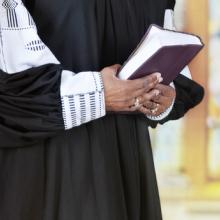women clergy
In some ways, that conversation continues to change as we work through issues of inequality. In a world in which the U.S. women’s team wins the World Cup, we still fight for equal pay, for recognition. In the church, it’s a constant uphill battle to get people to respect women as much as men, and while the conversation makes a lot of people uncomfortable, we are still having it. I wouldn’t know how to begin these conversations if I hadn’t encountered the leadership of women in the church.
Every International Women’s Day, Sojourners has the honor and challenge of selecting the women who are most inspiring us in the ways they are leading the church, and through it, the world. This year’s group of women includes pastors and artists, professors and activists, lawyers and painters. Collectively, they are shaping the church into a more inclusive, daring, honest, and action-oriented community of believers. We thank them for it. Below, learn why their work is so important, and pray along with these leaders as you receive their blessings for 2019.

Image via Jenny Rainbow/Shutterstock.com
In 2016, I celebrate 20 years of walking in the footsteps of many women who have paved the way for me to me to become a leader. On this day in Women’s History Month, I write about two women of God who stand out most. You’ll find the name of one in the Bible and the other on my birth certificate.

Image via TTstudio/Shutterstock.com
A series of essays in the semi-official Vatican newspaper is urging the Catholic Church to allow women to preach from the pulpit at Mass, a role reserved almost exclusively to the all-male priesthood for nearly 800 years.
“This topic is a delicate one, but I believe it is urgent that we address it,” Enzo Bianchi, leader of an ecumenical religious community in northern Italy and a popular Catholic commentator, wrote in his article in L’Osservatore Romano.
One afternoon I was invited to share my experiences as a woman in Christian leadership — the challenges, joys, issues, struggles and blessings. It felt like those of us sharing were instant, intimate, connected soul sisters. Without knowing each other, and as different as our stories were, the common threads ran deep. We were all women in high levels of leadership in Christian organizations. So why does it still hurt so much? We’ve made so much progress, haven’t we?
After some questions, we reviewed what we would each share from our different perspectives. This would be a heartfelt, sincere, and vulnerable time of sharing. But I wasn’t quite prepared for what happened. The opening question was, “When did you first experience a challenge or issue with your leadership as a woman?” As the first woman began her story, the vulnerable places of her past and present began to flow through tears streaming down her face. And my own eyes welled up and brimmed over. This struck home to the core of my own experience. This is hard. It hurts.
Here are just a few of the barriers we shared about that afternoon. There’s the way that women are looked at differently with respect to their leadership styles. What is seen as strength in a man’s style may be critiqued as aggressive in a woman. When a man’s ego affects his decision-making, rarely is it confronted or dealt with, whereas a woman is called out for letting her emotions get in the way. This feeds the fear for many women leaders that it’s not OK to display any vulnerability. As much as we don’t want to admit it, there is also still a bit of a “good ole boy” way of operating even in Christian organizations that are advocates of reconciliation. To call it out can get one the blame of having a “chip on one’s shoulder” and playing the gender card for personal gain.
It was a gathering that would have been unthinkable just five years ago.
On a cool summer evening, in a borrowed classroom overlooking San Francisco Bay, about 150 men and women gathered to screen a short documentary about a Mormon family whose 13-year-old son came out as gay.
The Montgomerys, who accepted their son and his news, were ostracized by church members, some of whom refused to accept Communion distributed by the young man in church. Like many conservative Christian denominations, the 15 million-member Church of Jesus Christ of Latter-day Saints bans homosexual activity and considers it grounds for exclusion from Mormon rites, rituals and even the afterlife.
Two U.S. regional groups of the Seventh-day Adventist Church have recently approved the ordination of women pastors, moving faster than the worldwide church’s study of the issue.
The Pacific Union Conference, which includes California and four other Western states, voted 79 percent to 21 percent at a special session on Aug. 19 to “approve ordinations to the gospel ministry without regard to gender.” Weeks earlier, the Maryland-based Columbia Union Conference, which includes eight Mid-Atlantic states, adopted a similar change in its policy, with 80 percent in favor.
World leaders of the church – who appealed for unity before the votes were cast – said they were disappointed with the conferences’ actions. They said the Columbia Union’s July 29 action was “not in harmony” with the general policy of the church, and said the Pacific Union would “preempt the collective decisions of the world church regarding ordination.’’
Leaders of the Maryland-based Seventh-day Adventist Church, which is best known for observing the Sabbath on Saturday instead of Sunday, are in the midst of studying the “theology of ordination” for possible consideration at their 2015 General Conference Session.
NEW YORK CITY — Today and Wednesday, I have the privilege of attending a private gathering here in the SoHo neighborhood of Manhattan with Eugene Peterson, the 80-year-old theologian and prolific author best known for his para-translation of the Bible, The Message.
The two-day event, Q Practices, is part-retreat, part-seminar on the theme of how we might cultivate our inner lives in an age of epic distractions.
I'll be reporting more fully later, but wanted to share with you a few gems from Peterson, who recently published a marvelous memoir titled, simply, The Pastor, from this morning's sessions.
Peterson, who is a Presbyterian minister (now retired from the pastorate after 30 years), grew up in Montana in the Pentecostal Christian tradition. His mother, in fact, was a preacher who later founded and pastored her own church.




